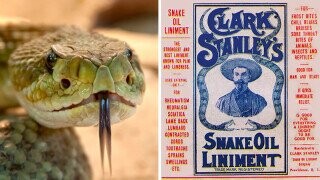How The Original (And Literal) Snake Oil Salesman Got Started

A snake oil salesman is anyone who sells remedies or anything else with claims of miraculous, unproven healing abilities. Back in the day, there was an OG snake oil salesman, a man so confident in his confidence scheme that he dubbed himself the Rattlesnake King (like a 19th-century Joe Exotic). Clark Stanley sold snake oil, and he eventually found himself in trouble with the government.
The term “snake oil” became infamously associated with medicine that does nothing, but the origins of snake oil are more legitimate. Oil from Chinese water snakes was used as a treatment for arthritis, pain, and inflammation. Chemically, this is due to the Omega-3 content in the Chinese water snake oil. Americans learned of this medicinal oil because of the influx of Chinese migrant workers on the American Transcontinental Railroad. This physically exhausting work naturally led to a lot of pain that needed relieving, and the Chinese workers brought snake oil with them to do the job.
Don't Miss
Around the same time that Americans were catching on, there was a trend of illegitimate medicines, substances that did nothing and would today be considered “snake oil.” One of these fake medicine inventors was Clark Stanley.

Clark Stanley
Stanley presented himself as a cowboy who learned the powers of snake oil from Hopi Native Americans. Because Chinese water snakes were not found in the United States, Stanley used rattlesnake oil for his remedy. This is important because chemically, rattlesnakes do not have the same properties as Chinese water snakes. However, people at the time didn’t know this and the product sounded “exotic,” so surely it must be good.
“Stanley’s Snake Oil” became a legitimate empire with multiple production facilities. He gained additional attention at the 1893 World’s Columbian Exposition where he demonstrated the process of slicing a rattlesnake open and obtaining its oil. This did nothing to prove that the oil could even do anything medicinal, but it apparently left audiences impressed.
The Rattlesnake King would continue to peddle his snake oil for decades, but the government began to crack down on fake medicines like this. The Pure Food and Drug Act of 1906 sought to eliminate fraudulent, mislabeled medicines like Stanley’s, and in 1916, Stanley’s Snake Oil was investigated. The investigation found that the product contained mineral oil, capsaicin, and turpentine.
It did not contain snake oil. Yes, the rattlesnake oil, which would have already been less effective than Chinese water snake oil, did not even contain the oil of any snakes of any nation. For this, Stanley was fined $20, which when adjusting for inflation is … yeah, that’s probably not sufficient punishment for marketing a fraudulent product.
Minor consolation to any of the people Stanley scammed over the years, at least he messed up so badly that his scam became the go-to idiom for similar scams.
Top Image: Foto-Rabe/Pixabay, Clark Stanley